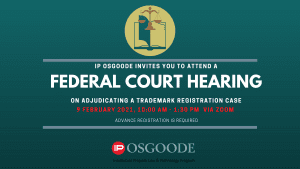
One day before an “appawing” virtual hearing went viral, IP Osgoode arranged and witnessed a smooth Federal Court virtual hearing via Zoom Business video conference. While many stories about the mishaps of virtual hearings and the challenges courts are facing have been making rounds during these unprecedented times, the courts have ensured access to justice by adapting to technological advances. Virtual hearings are not a new concept for arbitral proceedings, since these disputes are resolved internationally and have judges sitting globally. Nevertheless, Canada’s transition for its traditional judicial system and domestic court rooms has been prudent to survive the ever-changing dynamics of this novel coronavirus and its new strains.
On February 9th, 2021, the Federal Court heard an appeal under s. 56 of Trademarks Act of Sim & McBurney and en Vogue Sculptured Nail Systems Inc. The Act allows an appeal within two months from the decision of the Registrar for a use or non-use order passed under s. 45, which was filed by the Applicant at the Federal Court in the present case. A non-use cancellation proceeding allows any person to question the use of a registered trademark in Canada, provided written request with notice to the registered owner of the trademark. In this case, the Registrar of Trademark had passed an order on January 29, 2020 to amend the description of the goods through deletion of certain goods under the trademark registration no. TMA789,288, “en Vogue.” This decision helped to maintain the trademark registration in the database with an amended description of goods for which the Respondent was able to show use. The applicant, however, brought this appeal at the Federal Court on grounds that the Registrar erred in law under s. 4 and s. 45 of the Act; and in fact, regarding the correlation of the goods with the exhibited evidence filed.
The issues in law stemmed from the standard of review application. There have been considerable changes in the application of this test since Vavilov. In Vavilov, the court clarified that all questions of law would be reviewed for correctness, while questions of fact or mixed fact and law would be reviewed for “palpable and overriding error.” However, the Applicant counsel in this case has relied on Diamant Elinor Inc. v. 88766 Canada Inc., where the registrant’s appeal was dismissed and Registrar’s decision of expungement of the trademark was affirmed on the basis of the standard of reasonableness simpliciter. In Molson Breweries v. John Labatt Ltd, the court applied the standard of reasonableness simpliciter test since no additional evidence was adduced at appeal. Similarly, in the present case, the Respondent has not adduced any additional evidence. After hearing submissions from counsel for both parties, the Honourable Justice Janet M. Fuhrer reserved the order for a future date. It will be interesting to see her decision.
The Courts have used virtual platforms to survive the pandemic’s disruption to court proceedings. After in-person courtroom hearings were suspended, they quickly revived after May 2020. The courts have created appropriate exhaustive guidelines and procedures for online hearings. Although virtual hearings have many limitations (for obvious reasons) for the Federal Court and other Court proceedings, the Courts have maintained their Open Court Room Policy by giving access to the public and media. Their access has many caveats, and the format of the virtual hearing is primarily to observe the proceeding without being granted a screen space. In other words, the public and media can view the judicial officer and the counsels’ submissions but are not visible and their mics are turned off at all times. Upon special request and for educational purposes, the IP Osgoode team was granted an unrecorded Q&A session after the proceedings.
In conclusion, we cannot brush aside the challenges that lawyers, government officials and the judicial system as a whole face to present a case zealously through e-hearings. However, in this case, counsel for both parties, in their own words, suggested that this e-hearing experience was a blessing in disguise. Their clients also prefer this cost-effective infrastructure without much loss of efficacy. Both counsel would like to explore this viable option more in the coming days, as they can jump from one e-court room to another without having to spend much of their energy and travel time.
Written by Aishwerya Kansal, IPilogue Contributor, an IP Innovation Clinic Fellow, Masters in Law in International Business Laws, Osgoode Hall Law School 2020, and Internationally Trained Lawyer.

